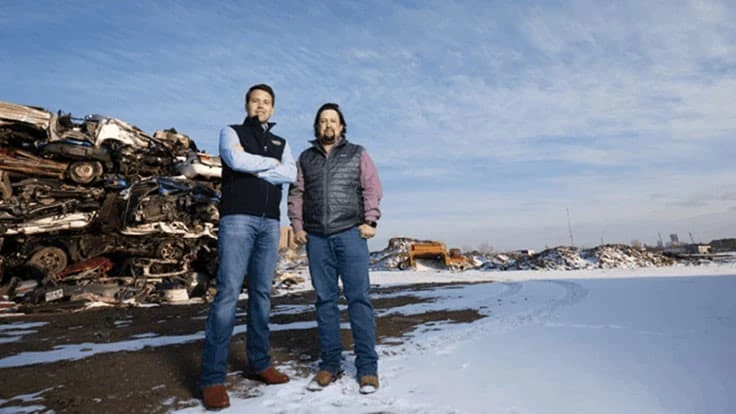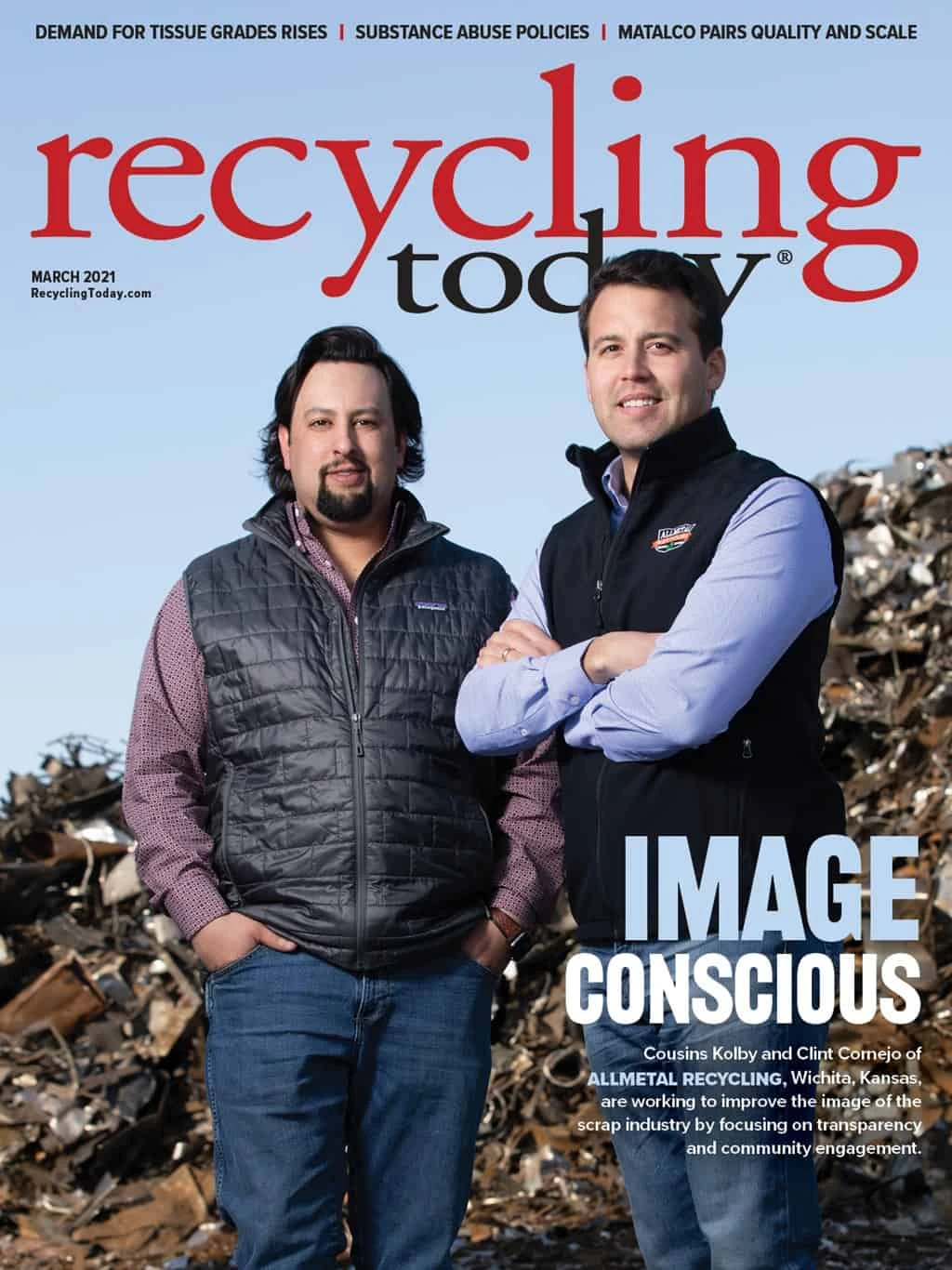
Photos by Aaron Payton

Scrap companies haven’t always had the best reputations when it comes to the wider communities in which they operate. They can be seen as eyesores at best and sources of pollution at worst. Customers might view their pricing with skepticism, claiming it lacks transparency.
When brothers Marty and Ron Cornejo founded Allmetal Recycling in Wichita, Kansas, in 2009, they sought to change the image of the scrap industry by offering their customers transparency in their business dealings and well- maintained scrap yards and equipment, as well as being environmental stewards and contributing to the community. That tradition is still alive with their sons, Clint and Kolby, the second generation of the Cornejo family to own and operate the Allmetal Recycling business.
Founding fathers
Marty and Ron established Allmetal Recycling when they purchased and renamed Caster Iron & Metal in 2009. The brothers became familiar with the scrap industry while running their previous company, a construction firm named Cornejo & Sons, which they sold in 2010.
After purchasing the Caster Iron & Metal yard, Marty and Ron sought to make it more inviting to their retail customers, who at the time made up the bulk of the company’s business, Clint says. They fully paved the yard and focused on maintaining safe operations.
The brothers then expanded the business in 2012 with the purchase of Kamen Iron & Metal, also based in Wichita, and several smaller businesses that they consolidated into the former Kamen property on 21st Street. This site is the home of Allmetal Recycling’s headquarters.
Around that time, Marty’s son Clint and Ron’s son Kolby began working in the business. Thirty-one-year-old Clint says he and 29-year-old Kolby always enjoyed being around the family business, taking any chance they had as young kids to work on a Saturday. They also were passionate about working for the family business during the summer of their high school and college days. Kolby began working at Allmetal in 2011 and Clint shortly after that in 2012.
In 2015, the cousins took over ownership and day-to-day operation of the business from their fathers, who remain somewhat involved, particularly when it comes to property, equipment purchases or acquisitions, Clint says. Of working with their fathers, he adds, “It’s been fun. They allow us to make mistakes and correct us when they need to.”
He and Kolby are “hands-on” owners, Clint says. They enjoy getting out into the yard and running equipment, which he says is “the fun part of the business.” Clint adds, “We try to limit the time we spend behind the desk as much as possible.”
”Since the shredder location acquisition, we have been able to source and grow a consistent and larger volume of shred feed, and we plan on adding a few more pieces to our nonferrous downstream process.” – Clint Cornejo, general manager, Allmetal Recycling
While Kolby is operations manager and Clint is general manger, their roles are not rigidly defined, Clint says. “We’re involved in all aspects of the business.”
The cousins always have been close, having grown up across the street from one another. “We have a sense for what the other is thinking, and we trust each other with decisions,” Clint says.

Acquiring minds
Since becoming the owners of Allmetal nearly six years ago, Kolby and Clint have expanded the company’s footprint in Kansas through a number of acquisitions, including Wichita-based Glickman Metal Recycling in 2019 and Salina Iron & Metal in Salina, Kansas, most recently.
Regarding these former competitors, Clint says they and Allmetal shared respect for one another and had good business relationships. “Relationships are everything in business,” he adds. “Without a doubt, that has been the case with these acquisitions.”
Most of the companies Allmetal Recycling has acquired were owned by people who were looking to retire and exit the industry, he says. “It was personal for a lot of these guys,” Clint says of these companies’ owners’ decisions to sell to Allmetal. “They recognized our rapid growth and our capabilities for expansion, improvements and the overall way we handle our business. They knew they were dealing with a reputable company that could take what they have built to the next level.”
Clint says part of changing the reputation of the scrap industry involved providing more transparency with scale tickets and offering a customer portal where industrial clients can see their loads and tickets, something the company’s software, which is provided by ScrapRight of Waynesboro, Pennsylvania, facilitates.
By offering this level of transparency, Clint says, “We gained a lot of market share and trust with current and potential industrial customers.”
While the 2018 acquisition of Wichita-based SOS Metals Midwest expanded the Allmetal footprint into the aerospace sector (Spirit Aerosystems, Textron Aviation and Bombardier Learjet are based in Wichita.), the purchase of the former Glickman yard and auto shredder expanded the company’s processing capabilities. This purchase allowed Allmetal more capacity to handle the material from its feeder yards and industrial accounts and made the company an outlet for other scrap dealers and salvage yards in the mid-Kansas area.
“Since the shredder location acquisition, we have been able to source and grow a consistent and larger volume of shred feed, and we plan on adding a few more pieces to our nonferrous downstream process,” Clint says. “We are slowly bolting that [downstream process] together and doing foundations for that. Hopefully, that is up and running in May of this year,” he adds.
Those additions to the shredder’s existing nonferrous downstream will allow Allmetal Recycling to go from producing zorba and zurik packages to also producing twitch and red heavies packages, Kolby explains.

Through its acquisitions, Allmetal Recycling’s client base also has shifted to primarily commercial customers, particularly in the aerospace and agricultural industries. Clint says 80 to 90 percent of the company’s business is with industrial accounts; the reverse was true when Allmetal was founded. He adds, “We try not to forget how we got started and continue to provide quality service to our retail customers.”
The company operates a total of six yards: three in Wichita, and one each in Harper, Newton and Salina, Kansas. Allmetal services accounts as far as Nebraska to the north and as far south as northern Oklahoma.
Allmetal sells its ferrous scrap to consumers throughout the Midwest and South via railroad, Clint says, while its nonferrous scrap is transported all over the U.S. and internationally. The company handles 185,000 to 200,000 tons of ferrous scrap annually, and 65 million to 75 million pounds of nonferrous scrap. Most of the nonferrous Allmetal handles is from the aerospace sector, Clint says.
While industrial generation overall has returned to within 80 to 90 percent of prepandemic levels, the aerospace sector is still off by about 50 percent, he says. Clint says he does not expect that industry to rebound from the pandemic until 2022.
Detail oriented
2020 brought a host of challenges to businesses globally, and that includes Allmetal. But Clint says he and Kolby are focusing on what they can control. That means watching what they are buying and selling.
Keeping up with technology, particularly downstream from the shredder, also presents a challenge. While Clint says it’s important to “pinch as much material as you can off the shredder,” he adds that it is possible to go too far when investing in downstream equipment. “We’re doing things right, I believe, and we have learned quickly on where and what equipment to invest in,” he says.
Kolby adds that the company is investing in concrete and housekeeping as well as equipment, which goes back to its desire to improve the profile of the scrap industry in the communities where the company operates. “We spend more time here than we do in our own homes, so we like our yards and facilities to be first class,” he says.
Allmetal does a good deal of this work in-house rather than using outside contractors. “Although much of the improvements we do cannot be tracked for an ROI (return on investment), we believe it’s money well-spent and helps retain customers and provides a positive work environment for our employees,” Clint adds.
The company purchases equipment used when it can to refurbish in its maintenance shop. Allmetal employs 10 full-time mechanics, five full-time welders, two men who do concrete work and three full-time painters to ensure the company’s facilities and rolling stock are making good impressions among its neighbors and customers. That “attention to detail,” as Clint calls it, “all goes back to changing the image of the industry.”
He says Allmetal’s goal is to “exceed expectations daily,” adding, “If you are doing that, whether it’s an employee or customer unloading at the tin pile or an aerospace customer, you are doing things right.”

Explore the March 2021 Issue
Check out more from this issue and find your next story to read.
Latest from Recycling Today
- Lautenbach Recycling names business development manager
- Sebright Products partners with German waste management equipment company
- WasteExpo transitions to biennial format for enhanced experiences
- Study highlights progress, challenges in meeting PCR goals for packaging
- Washington legislature passes EPR bill
- PureCycle makes progress on use of PureFive resin in film trials
- New copper alloy achieves unprecedented high-temperature performance
- Gränges boosts profits and sales volume in Q1 2025






